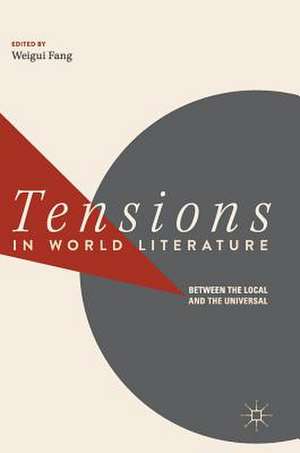Tensions in World Literature: Between the Local and the Universal
Editat de Weigui Fangen Limba Engleză Hardback – 11 oct 2018
| Toate formatele și edițiile | Preț | Express |
|---|---|---|
| Paperback (1) | 947.18 lei 6-8 săpt. | |
| Springer Nature Singapore – 29 ian 2019 | 947.18 lei 6-8 săpt. | |
| Hardback (1) | 952.40 lei 6-8 săpt. | |
| Springer Nature Singapore – 11 oct 2018 | 952.40 lei 6-8 săpt. |
Preț: 952.40 lei
Preț vechi: 1161.47 lei
-18% Nou
Puncte Express: 1429
Preț estimativ în valută:
182.29€ • 189.59$ • 152.76£
182.29€ • 189.59$ • 152.76£
Carte tipărită la comandă
Livrare economică 14-28 martie
Preluare comenzi: 021 569.72.76
Specificații
ISBN-13: 9789811306341
ISBN-10: 9811306346
Pagini: 367
Ilustrații: XV, 398 p. 42 illus.
Dimensiuni: 148 x 210 x 35 mm
Greutate: 0.64 kg
Ediția:1st ed. 2018
Editura: Springer Nature Singapore
Colecția Palgrave Macmillan
Locul publicării:Singapore, Singapore
ISBN-10: 9811306346
Pagini: 367
Ilustrații: XV, 398 p. 42 illus.
Dimensiuni: 148 x 210 x 35 mm
Greutate: 0.64 kg
Ediția:1st ed. 2018
Editura: Springer Nature Singapore
Colecția Palgrave Macmillan
Locul publicării:Singapore, Singapore
Cuprins
1 Introduction: What Is World Literature?
2 Comparative Literature and World Literature: From Goethe to Globalization
3 The Location of World Literature
4 Frames for World Literature
5 World Literature and the Encounter with the Other: A Means or a Menace?
6 Some Remarks on the Concept of World Literature After 2000
7 World Literature, Canon, and Literary Criticism
8 Four Perspectives on World Literature: Reader, Producer, Text and System
9 A World of Translation
10 World Literature in Graphic Novels and Graphic Novels as World Literature
11 Experiments in Cultural Connectivity: Early Twentieth-Century German-Jewish Thought Meets the Daodejing
12 Ideographic Myth and Misconceptions about Chinese Poetic Art
13 Chinese Literature as Part of World Literature
14 How to Become World Literature: Chinese Literature’s Aspiration and Way to “Step into the World”
15 World Literature from and in China
Dialogue Section A: World Literature and Nation Building
Dialogue Section B: The Interactions between the Local and the Universal: A Few Thoughts after Listening to the Talk of Professor Damrosch
Dialogue Section C: World Literature: Significance, Challenge, and Future
Dialogue Section D: Who Decides the “United Nations of Great Books”: Inspired by Prof. Zhang’s Speech
Dialogue Section E: Response
Notă biografică
Weigui Fang is Distinguished Professor at the School of Chinese Language and Literature, Beijing Normal University, China. He is Changjiang Scholar and Director of the Center for Literature and the History of Ideas at BNU. As an internationally acclaimed comparatist, his research is focused on Comparative Literature, modern Chinese culture and literature, History of Concepts, Sociology of Literature, and international sinology. He has authored 8 books and published more than 100 scholarly papers.
Textul de pe ultima copertă
This collection gives a diversified account of world literature, examining not only the rise of the concept, but also problems such as the relation between the local and the universal, and the tensions between national culture and global ethics. In this context, it focuses on the complex relationship between Chinese literature and world literature, not only in the sense of providing an exemplary case study, but also as an introspection and re-location of Chinese literature itself. The book activates the concept of world literature at a time when it is facing the rising modern day challenges of race, class and culture.
Caracteristici
Examines the rise of the concept of World Literature and the tensions between local and universal
Considers the complex relationship between Chinese literature and world literature
Reflects on key issues pertaining to Chinese literature in a global context such as race, class and culture
Considers the complex relationship between Chinese literature and world literature
Reflects on key issues pertaining to Chinese literature in a global context such as race, class and culture
